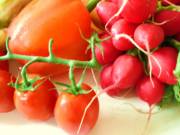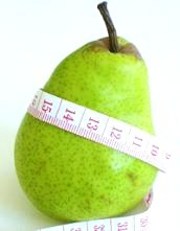Gallbladder Diet Plan: 6 Tips for Preventing Gallstone Attacks
Prevention is by far the best "treatment" for gallstones, those pebble-like deposits that can form in the gallbladder. So, how do you prevent gallstones? By paying attention to what you include in your diet plan! Here are six diet tips that can help you prevent gallstone attacks.
Important notice: The information on this page and elsewhere on this website is neither intended nor implied to be a substitute for professional medical, nutritional, or health advice. You should always seek the advice of your physician or another qualified health care provider for any questions or concerns you may have regarding your health.
#1: Follow a Low Glycemic Diet
Carbohydrates that have a high Glycemic Index (GI) rating are quickly broken down by the body and cause a rapid, large rise in blood glucose levels, which in turn generally triggers the pancreas to release large amounts of insulin. In contrast, low-GI carbohydrates, which take much longer to digest, generally cause only a small, slow rise in the blood glucose and insulin levels.
It has been known for quite some time that a diet focusing on low-GI foods rather than high-GI foods can reduce a person's risk of developing diabetes. Now, recent research suggests that a low glycemic diet could also help prevent gallstone attacks. Most non-starchy vegetables, legumes and fruit have a low GI rating, so be sure to include plenty of these foods in your gallbladder diet plan! Refined carbohydrate-rich foods and potatoes are rated high on the Glycemic Index.

#2: Cut Down on Animal Protein
A significant number of animal studies have shown that a diet low in meat protein and high in plant protein can inhibit gallstone formation in animals. The difference in the lysine/arginine ratio of the different types of proteins may be responsible for the observed differences in gallstone incidence. Plant proteins, such as soy, nuts, and seeds, generally have a high concentration of the amino acid arginine in relation to the amino acid lycine, while animal proteins typically contain high levels of lycine in relation to arginine.
Research investigating the relation between different types of protein and gallstone formation in humans, however, is scarce. Nevertheless, there is some evidence suggesting that what holds true for animals may also hold for people. The Nurses' Health Study, a cohort study following American women during 20 years from 1980 until 2000, found that increased consumption of vegetable protein would result in a lower risk of gallstones formation — provided that the energy levels were balanced.gas.
#3: Step Up Your Magnesium Intake
Add more magnesium-rich foods to your diet may be one of the best tips you can follow when designing your gallbladder diet plan. A large cohort study with 42,705 American men published in The American Journal of Gastroenterology found that an increased intake of supplemental and/or dietary magnesium was associated with a reduced risk of gallstones. After adjusting the results to account for age differences, the researchers found that men with the highest average magnesium intake (454 mg/d) were about 30% less likely to develop gallstones than men with the lowest average intake (262 mg/d).
The exact mechanism by which magnesium can reduce the risk of gallstones is, however, not known, but it might have to do with magnesium's ability to control plasma triglycerides and maintain the HDL-cholesterol ("good cholesterol") levels. Mild deficiencies of magnesium are fairly common in Western countries, where consumption of processed foods is common, as processing significantly decrease the magnesium content of foods. Also intensive farming, practiced in many Western countries, depletes the soil of magnesium, thereby reducing the magnesium content of the plants growing in the soil.
#4: Eat Plenty of Fiber-Rich Foods
A diet rich in fiber has been shown to reduce the risk of gallstone formation. A study following the eating habits of 69,000 women over a period of 16 years found that those who consumed the most fiber overall had a 13% lower risk of getting gallstones, compared to those consumed the least fiber. The protective effect of fiber was even more pronounced in the case of diets rich in insoluble fiber. The researchers speculated that the protective effects of insoluble fiber might be linked to its ability to speed up the intestinal transit time (how long it takes for food to travel through the intestines), to control the secretion of bile acids, fight insulin resistance, and lower triglycerides.
If you are currently not eating a lot of fruit, vegetables, legumes, and whole grains, try adding these fiber-rich foods to your diet. Also, keep in mind that most of the fiber content of fruits and vegetables lies in the skin or close to the skin, and thus you might want to avoid peeling fruits and vegetables before eating them (of course, there are certain foods that must be peeled). Furthermore, it is important that you add fiber to the diet gradually; a sudden, dramatic increase in fiber may cause bloating and gas. Also, fibrous foods should be accompanied with plenty of water in order to avoid constipation.

#5: Cut Down on Calories
A high energy intake has been associated with an increased risk of gallstones, mainly because it can contribute to the development of obesity and overweight. Even slightly overweight people have a significantly higher risk of developing gallstones than normal-weight people. Being merely 10 pounds overweight doubles the risk of gallstones, and being obese increases the risk up to 6 times. However, it is important not to cut off calories too fast: research has shown that losing more than 2 to 3 pounds per week is itself a risk factor for developing gallstones. This is because rapid weight loss can impair the production of bile salts which keep cholesterol soluble. Furthermore, fasting and crash dieting can hinder gallbladder contractions and thus the release of bile.
#6: Favor Unsaturated Fats
A diet low in saturated fats — the kind that is generally found in meat — and high in unsaturated fats has been shown to reduce the risk of gallstone formation. A study following the eating habits of 45,000 men over a period of 14 years found that those who consumed the most unsaturated fats — such as vegetable oils — had an 18% lower risk of getting gallstones, compared to those who consumed the least unsaturated fat. The researchers suggested that the protective effects of unsaturated fat could be attributed to its ability to make cells more sensitive to insulin, which is thought to reduce gallstone formation. The results of this cohort study are supported by a smaller studies conducted in Greece and Israel as well as animal studies.

